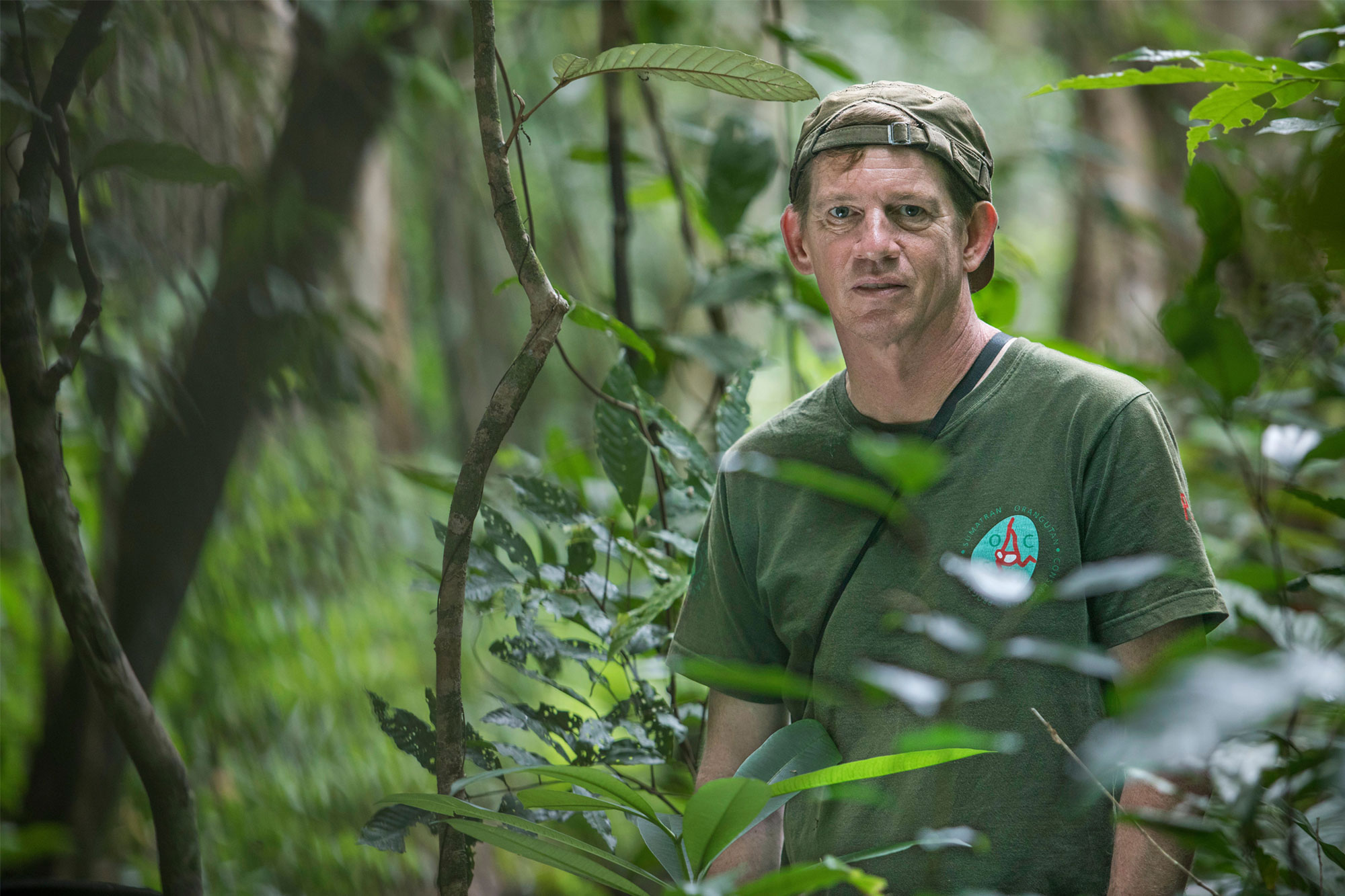Renowned orangutan conservationist, Dr Ian Singleton, has been awarded an OBE (Officer of the Most Excellent Order of the British Empire) by Her Majesty the Queen for Services to the Environment and Conservation. The announcement of the Queen’s Birthday Honours list usually takes place in June, but has been delayed this year to enable recognition of some of the leading actors in the battle against the COVID-19 pandemic.
In 2001, Dr Singleton founded the Sumatran Orangutan Conservation Programme (SOCP) working for the Swiss-based PanEco Foundation, alongside its Indonesian partner NGO, the Sustainable Ecosystem Foundation (Yayasan Ekosistem Lestari; YEL), and the Indonesian Ministry of Environment and Forestry’s Directorate General for the Conservation of Natural Resources and Ecosystems (Ditjen KSDAE).
Dr Singleton began his career with orangutans more than 30 years ago, in 1989, working for another OBE recipient, Gerald Durrell, at his world-renowned Jersey Zoo in the British Channel Islands. He left Jersey in 1996 to study wild orangutans in Sumatra for his PhD with the Durrell Institute of Conservation and Ecology (DICE) and, after completing his thesis in 2000, headed back to Sumatra immediately to establish the SOCP and help protect and conserve wild orangutans and their habitat. Ian was also one of a team of scientists that, in 2017, described to the world a new species of orangutan, the Tapanuli orangutan, named after the region where it occurs.
“Ian was an exceptional keeper during his time with Gerry and me at the Jersey Zoo, but it was always obvious that he wanted to do more. It’s been extremely rewarding to watch him grow, since then, into what he is today, one of the most well-rounded and effective conservationists for some of the planet’s most threatened species and habitats, taking on some of the biggest issues of our time,” commented Dr Lee Durrell, MBE, widow of Gerald Durrell.
One of Dr Singleton’s mentors during his PhD research and beyond, renowned primatologist Professor Dr Carel van Schaik, said, “From the day I met him, I knew Ian was destined for greatness. He had a singular stamina, was equally at home in the forest and in the villages, and had only one aim: to save the orangutan from extinction. Since he founded the SOCP twenty years ago, he has given hundreds of ex-captive animals a new lease of life in the jungle. The secret of his success? His unconditional love for the animals.”
“I am extremely honoured, and very proud, that all of our hard work over the years has been recognised, but it hasn’t been the work of any one individual, or organisation. This award is recognition for the entire team of dedicated conservationists, most of them Indonesian, that I have had the pleasure and honour to work with throughout my career, and our many colleagues within the Indonesian Ministry of Environment and Forestry’s own Conservation Department,” Dr Singleton emphasised. “But, of course, it is something that myself and my family will treasure for a very long time.
“The work also remains unfinished. There are still many orangutans in Sumatra being kept illegally as pets, or trapped and isolated in fragmented forest patches. We need to get these individuals back to safe and protected rainforests again, where they can contribute to the future of their species,” added Singleton, “At our project sites in Jantho and Jambi, we are releasing these ‘refugees’ to create new, genetically viable populations of orangutans. These populations act as a ‘safety net’ or ‘back-up’, should a catastrophe befall the remaining truly wild populations.
“The value of the new wild populations we are creating has never been so apparent. Scientific consensus is that orangutans are likely to be susceptible to infection by the SARS-COV-2 virus that causes COVID-19 in humans, and we have a duty to keep not just our staff safe, but all of the orangutans as well, especially when we remember just how few of them there are left,” Ian explained. “Indeed, like others, we are very much on the front line of the COVID pandemic here too, but fighting to protect three species, not just one!
“We need to protect the remaining wild populations of both the Sumatran orangutan (Pongo abelii), today numbering only around 13,400 individuals, and their last real stronghold, the Leuser Ecosystem, and the fewer than 800 Tapanuli orangutans (Pongo tapanuliensis) that remain in their only habitat, the Batang Toru Ecosystem in North Sumatra. Both species are listed as Critically Endangered on the IUCN Red List of Threatened Species, and the Tapanuli orangutan is the most endangered great ape species in the world!
“We do what we can for all orangutans here in Sumatra, and that requires a lot of hard work by many different people and a lot of support. Without the recognition of all our supporters around the world, none of this work would be possible. We would also like to thank the Indonesian Ministry of Environment and Forestry, especially Minister Siti Nurbaya Bakar and Director General Wiratno, for their close collaboration, and we look forward to many more years of working together to protect Sumatra’s orangutans. It really is nice to be recognised and appreciated with an OBE, but I would like to thank all of the many people, organisations and institutions around the world that make the work of the SOCP happen,” Dr Singleton concluded.

